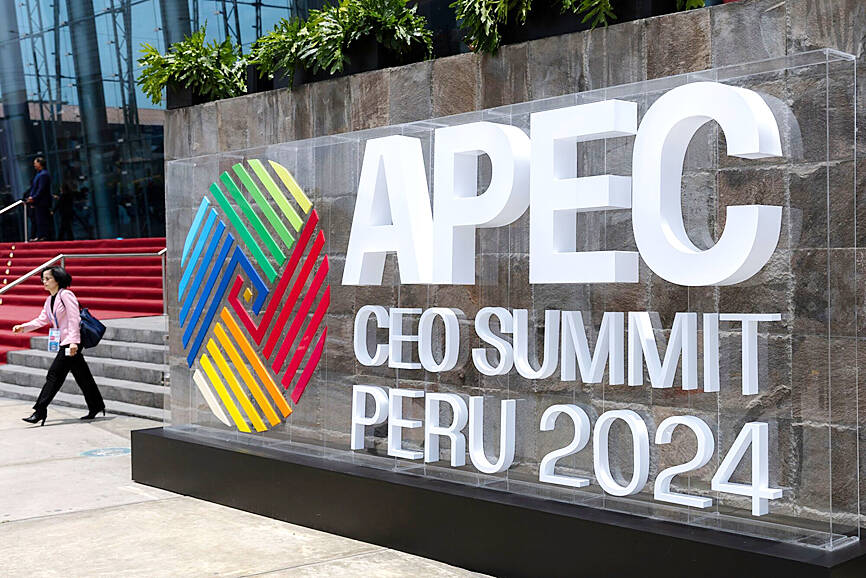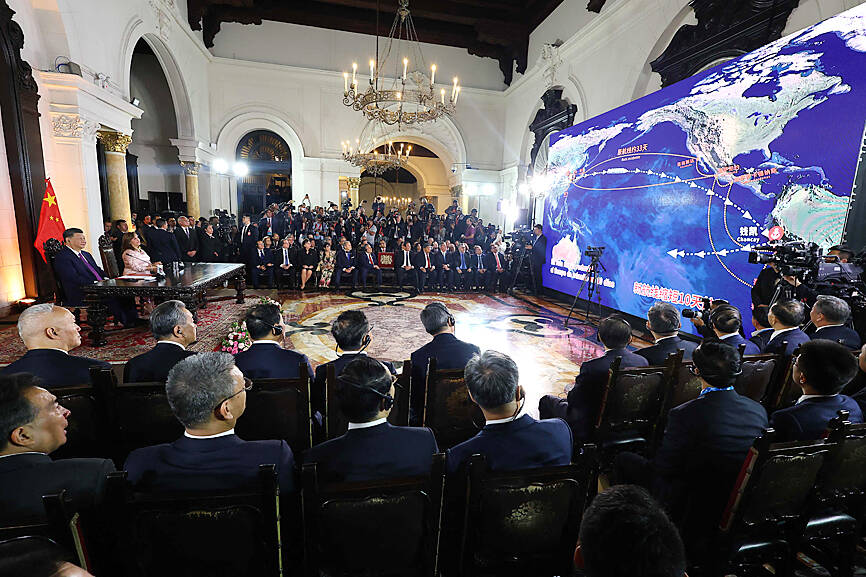After snubbing Taiwan’s initial APEC envoy, this year’s summit host, Peru, is pushing for China to host the 2026 gathering following Beijing’s inauguration this week of a massive deep-water port in the South American country, the Nikkei Asia reported, citing sources who also said China had asked Lima to obstruct Taipei’s bid to join the Comprehensive and Progressive Agreement for Trans-Pacific Partnership (CPTPP).
Two sources in Taipei said that Peru boycotted Taiwan’s first envoy pick — former vice president Chen Chien-jen (陳建仁) — by not sending an invitation to the summit, forcing President William Lai’s (賴清德) administration to scramble to find an alternative, the Nikkei Asia reported on Thursday.
Even though Taiwan is a full APEC member, Taiwanese presidents are unable to attend the leaders’ summits due to pressure from China.

Photo: Bloomberg
China’s growing clout in the region, including with Peruvian President Dina Boluarte, represents a challenge for US president-elect Donald Trump, the magazine reported.
On Thursday, the China-backed Chancay Mega-port, the largest deep-water port in South America, opened with the state-backed China Cosco Shipping Corp (中國遠洋海運) holding a lease to control it for 30 years, sources told the Nikkei Asia.
Chinese President Xi Jinping (習近平) and Boluarte participated in the opening of the port over video link, and signed a deal to widen a free-trade agreement.

Photo: AFP
Then-US Southern Command commander US Army General Laura Richardson earlier this month warned that Chancay could be used by the Chinese People’s Liberation Army Navy, the Nikkei Asia reported.
Bethany Allen, head of China investigations at the Australian Strategic Policy Institute, said that China’s heavy investments in deep-water ports tend to bring baggage, including a significant debt burden, environmental damage, concerns about geopolitical influence and the potential expansion of Chinese military power.
“Deep-sea ports built by China are generally believed to be dual-use, meaning they could also be used by Chinese military vessels” Allen told the Nikkei Asia.
US Assistant Secretary of State for Western Hemisphere Affairs Brian Nichols said in Lima that Latin American nations must be vigilant on Chinese investment, German public broadcaster Deutsche Welle (DW) reported on Friday.
“Chancay illustrates how China seeks secure access to resources and markets and its ever more successful fight to corner global value added,” DW cited Robert Evan Ellis, Latin America research professor at the US Army War College, as saying.
Guatemala-based CentroAmerica360 cited Ellis as saying that Cosco’s exclusive control over Chancay and the Boluarte government’s haste to change Peruvian laws to satisfy China, granting Cosco rights that other local operators do not have, powerfully illustrates how Beijing does business and secures its commercial and strategic interests.
Granting the exclusive rights to China has also raised fears that Peru could be turned into a launch pad for China’s military in a conflict with the US, while numerous sightings have been reported of Chinese military personnel at the port and administrative offices engaged in activities that go beyond commercial port operations, CentroAmerica360 said.
The northern sections of the port are designated for large communication stations and heavily fortified warehouses, as well as dormitories and training facilities, it said.
Domestic concerns are growing that the port could become a base similar to China’s military outpost in Djibouti, it added.
The Nikkei Asia cited analyst Marcin Jerzewski, a former visiting scholar at the National Library of Chile, as saying that Boluarte “wants to use the APEC summit as an opportunity to highlight the bilateral friendship [with China], such as inaugurating the Chancay port. Chancay is the crown jewel of China’s maritime expansion in the Western Hemisphere.”
The sources in Taipei said Peru’s push for China to host the 2026 APEC summit came without open discussion or full agreement by member states.
One of the sources said that a China-hosted APEC would mean “more suppression and interference,” the Nikkei Asia reported.
Also at issue is Taiwan’s bid to join the CPTPP, of which Peru is an original member, it said.
While Taipei and Beijing both applied to join in 2021, China has asked Peru to withhold approval for Taiwan, the sources said.
“China can prevent Taiwan from joining the CPTPP through Peru, which is very cost-effective,” it cited one of them as saying.
Several countries oppose efforts to grant China APEC hosting rights for 2026 without a consensus, fearing that Beijing could use the opportunity to apply more pressure on Taiwan, CentroAmerica360 reported.

MAKING WAVES: China’s maritime militia could become a nontraditional threat in war, clogging up shipping lanes to prevent US or Japanese intervention, a report said About 1,900 Chinese ships flying flags of convenience and fishing vessels that participated in China’s military exercises around Taiwan last month and in January last year have been listed for monitoring, Coast Guard Administration (CGA) Deputy Director-General Hsieh Ching-chin (謝慶欽) said yesterday. Following amendments to the Commercial Port Act (商港法) and the Law of Ships (船舶法) last month, the CGA can designate possible berthing areas or deny ports of call for vessels suspected of loitering around areas where undersea cables can be accessed, Oceans Affairs Council Minister Kuan Bi-ling (管碧玲) said. The list of suspected ships, originally 300, had risen to about

DAREDEVIL: Honnold said it had always been a dream of his to climb Taipei 101, while a Netflix producer said the skyscraper was ‘a real icon of this country’ US climber Alex Honnold yesterday took on Taiwan’s tallest building, becoming the first person to scale Taipei 101 without a rope, harness or safety net. Hundreds of spectators gathered at the base of the 101-story skyscraper to watch Honnold, 40, embark on his daredevil feat, which was also broadcast live on Netflix. Dressed in a red T-shirt and yellow custom-made climbing shoes, Honnold swiftly moved up the southeast face of the glass and steel building. At one point, he stepped onto a platform midway up to wave down at fans and onlookers who were taking photos. People watching from inside

Japan’s strategic alliance with the US would collapse if Tokyo were to turn away from a conflict in Taiwan, Japanese Prime Minister Sanae Takaichi said yesterday, but distanced herself from previous comments that suggested a possible military response in such an event. Takaichi expressed her latest views on a nationally broadcast TV program late on Monday, where an opposition party leader criticized her for igniting tensions with China with the earlier remarks. Ties between Japan and China have sunk to the worst level in years after Takaichi said in November that a hypothetical Chinese attack on Taiwan could bring about a Japanese

STREAMLINED: The dedicated funding would allow the US to transfer equipment to Taiwan when needed and order upgraded replacements for stockpiles, a source said The US House of Representatives on Thursday passed a defense appropriations bill totaling US$838.7 billion, of which US$1 billion is to be allocated to reinforcing security cooperation with Taiwan and US$150 million to replace defense articles provided to the nation. These are part of the Consolidated Appropriation Act, which the US House yesterday passed with 341 votes in favor and 88 against. The act must be passed by the US Senate before Friday next week to avoid another government shutdown. The US House Committee on Appropriations on Monday unveiled the act, saying that it allocates US$1 billion for the Taiwan Security Cooperation Initiative